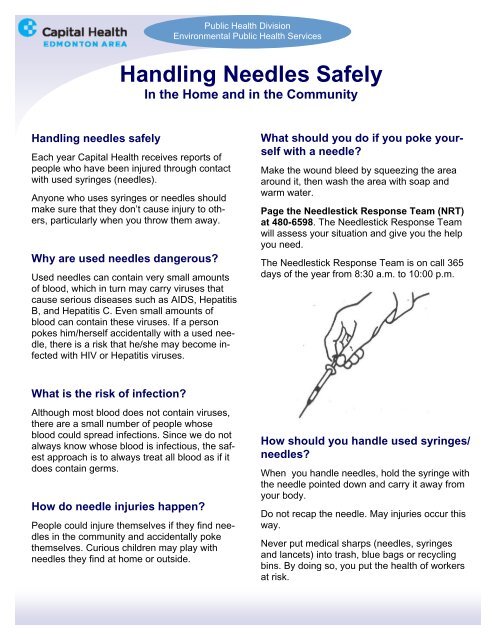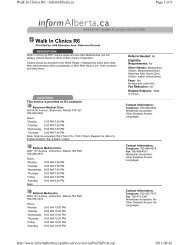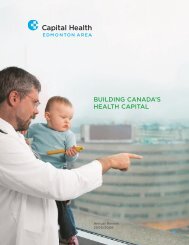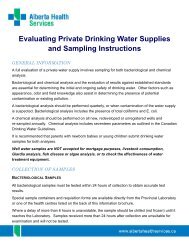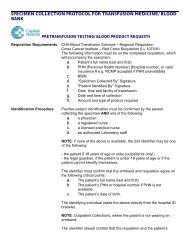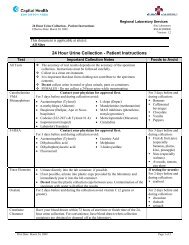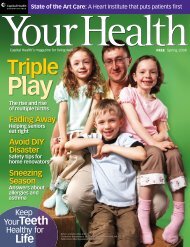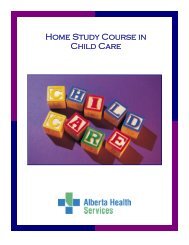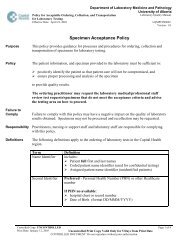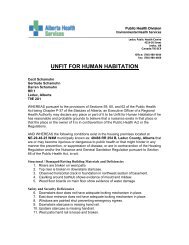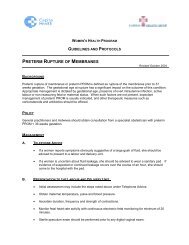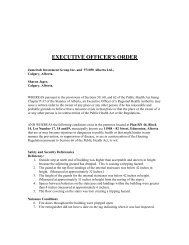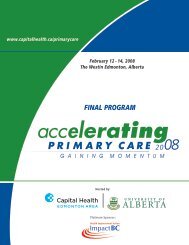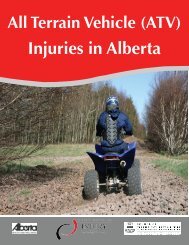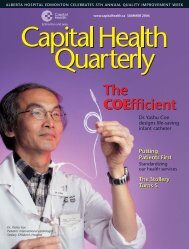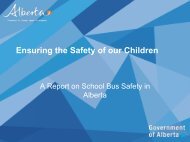Handling needles safely - revised Feb07.pub - Capital Health
Handling needles safely - revised Feb07.pub - Capital Health
Handling needles safely - revised Feb07.pub - Capital Health
You also want an ePaper? Increase the reach of your titles
YUMPU automatically turns print PDFs into web optimized ePapers that Google loves.
Public <strong>Health</strong> Division<br />
Environmental Public <strong>Health</strong> Services<br />
<strong>Handling</strong> Needles Safely<br />
In the Home and in the Community<br />
<strong>Handling</strong> <strong>needles</strong> <strong>safely</strong><br />
Each year <strong>Capital</strong> <strong>Health</strong> receives reports of<br />
people who have been injured through contact<br />
with used syringes (<strong>needles</strong>).<br />
Anyone who uses syringes or <strong>needles</strong> should<br />
make sure that they don’t cause injury to others,<br />
particularly when you throw them away.<br />
Why are used <strong>needles</strong> dangerous?<br />
Used <strong>needles</strong> can contain very small amounts<br />
of blood, which in turn may carry viruses that<br />
cause serious diseases such as AIDS, Hepatitis<br />
B, and Hepatitis C. Even small amounts of<br />
blood can contain these viruses. If a person<br />
pokes him/herself accidentally with a used needle,<br />
there is a risk that he/she may become infected<br />
with HIV or Hepatitis viruses.<br />
What should you do if you poke yourself<br />
with a needle?<br />
Make the wound bleed by squeezing the area<br />
around it, then wash the area with soap and<br />
warm water.<br />
Page the Needlestick Response Team (NRT)<br />
at 480-6598. The Needlestick Response Team<br />
will assess your situation and give you the help<br />
you need.<br />
The Needlestick Response Team is on call 365<br />
days of the year from 8:30 a.m. to 10:00 p.m.<br />
What is the risk of infection?<br />
Although most blood does not contain viruses,<br />
there are a small number of people whose<br />
blood could spread infections. Since we do not<br />
always know whose blood is infectious, the safest<br />
approach is to always treat all blood as if it<br />
does contain germs.<br />
How do needle injuries happen?<br />
People could injure themselves if they find <strong>needles</strong><br />
in the community and accidentally poke<br />
themselves. Curious children may play with<br />
<strong>needles</strong> they find at home or outside.<br />
How should you handle used syringes/<br />
<strong>needles</strong>?<br />
When you handle <strong>needles</strong>, hold the syringe with<br />
the needle pointed down and carry it away from<br />
your body.<br />
Do not recap the needle. May injuries occur this<br />
way.<br />
Never put medical sharps (<strong>needles</strong>, syringes<br />
and lancets) into trash, blue bags or recycling<br />
bins. By doing so, you put the health of workers<br />
at risk.
Public <strong>Health</strong> Division<br />
Environmental Public <strong>Health</strong> Services<br />
How should you dispose of used <strong>needles</strong>,<br />
syringes, and lancets?<br />
1. Place the items into a container made of<br />
strong plastic with a screw-top lid (like a<br />
peanut butter or bleach container), so the<br />
<strong>needles</strong> can’t poke through. You can buy<br />
special containers called sharps containers<br />
at drugstores if you wish. Make sure the<br />
container sits on a flat surface and the lid is<br />
secure. Keep the container out of the<br />
reach of children. When you’re ready to<br />
dispose of the container, tape it shut so <strong>needles</strong><br />
won’t fall out and injure anyone. Write<br />
on it, “Not for Recycling.”<br />
2. If you LIVE OUTSIDE EDMONTON, place<br />
the container into the household waste<br />
shortly before regular garbage pick-up.<br />
3. If you LIVE IN EDMONTON, follow the instructions<br />
on the following pamphlet by the<br />
City of Edmonton.<br />
For hours of operation, call the Waste Hotline<br />
At 496-5678 or www.edmonton.ca/waste<br />
4. You may also drop off your individual needle<br />
containers to the Canadian Diabetes Association<br />
(#1010, 10117 Jasper Avenue, Edmonton,<br />
Alberta).<br />
For more information regarding the safe disposal of <strong>needles</strong>,<br />
please call <strong>Capital</strong> <strong>Health</strong>, Public <strong>Health</strong> Division<br />
at 413-7928 or 413-7948<br />
For more information, please contact your nearest Environmental Public <strong>Health</strong> Services office.<br />
Edmonton Main Office<br />
<strong>Capital</strong> <strong>Health</strong> Centre - South Tower<br />
Strathcona<br />
(780) 413-7928<br />
(780) 735-1400<br />
(780) 467-5571<br />
Spruce Grove<br />
Leduc<br />
St. Albert<br />
(780) 962-7509<br />
(780) 980-4644<br />
(780) 459-6671<br />
EPHD-06-001<br />
Created: May/06<br />
Updated: Mar/07<br />
Updated: Jun/08


